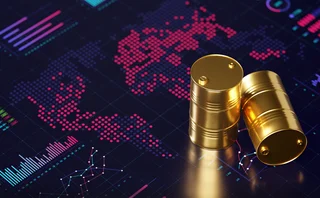
Deal of the year, Europe: Engie
Energy Risk Awards 2019: French utility is sole offtaker on 10-year contract in illiquid Romanian gas market

In 2017, the Midia Gas Development (MGD) project, based offshore Romania, set out to find a single buyer that would – despite the illiquid nature of the Romanian market – guarantee the offtake of gas from the development at Romanian market price.
Some time later, they found that partner in Engie, who developed an innovative model to offtake five billion cubic metres of gas a year for a period of 10 years, enabling the project to secure financing.
“We understood the private equity structure, which is debt financed, and we knew that the banks behind MGD would want access to a liquid hub that could be hedged, so that the banks could be sure of cashflows and rely on the debt,” says Daniel Simmons, head of gas origination at Engie.
“We knew we had to offer an option that gave full value for the gas delivered, and an option that allows them some visibility on forward prices to keep their banks happy.”
In order to find the most suitable partner, MGD – a joint venture between Black Sea Oil & Gas, Petroventures and GasPlus – engaged consultants to carry out an extensive search of firms with oil and gas capabilities. Some 18 potential counterparties were assessed and narrowed down to just three firms who were asked to produce a fully termed contract in order for MGD to make a decision.
“MGD negotiated three separate gas sales agreements with three separate counterparties in parallel and then in the end chose the best one,” says Simmons. “That put us under a period of stress for some time because of the depth of the competitive process. The team had to be extremely responsive and develop a good relationship with the client.”
Engie set out to win this competition through developing a new model to address the problems of working in an illiquid market.
“It required us to get the right people into the team, so it was both local and global,” Simmons says. “The Engie team was the core, with legal support and origination, all the management providing the drive necessary to get it done, plus our guys on the ground in Romania, which gave MGD a lot of comfort because they know the market inside and out.”
As well as being relatively illiquid, the Romanian market is challenging due to its fluid regulatory framework, Simmons says. “When we started discussions, Romania was liberalising its gas market but then, at the end of 2018, the government passed laws to re-regulate part of the market.”
We knew we had to offer an option that gave full value for the gas delivered, and an option that allows them some visibility on forward prices to keep their banks happy
Daniel Simmons, Engie
This has huge implications on market design and pricing. Legislative changes also impacted the deal. MGD had initially wanted its partner to market all of its production, but a change in Romanian legislation limited the amount of offtake allowed to 50% of output.
“To sign a stable long-term arrangement with a producer in a market where the regulation is changing very frequently required a good alignment between buyer and supplier, and a lot of buyer-supplier trust and collaboration and cooperation,” notes Simmons. “In parallel with the issues around regulatory risk we also had to tackle the liquidity issue in a way that worked for all parties.”
The deal’s contractual design is another noteworthy aspect as there are no renegotiation clauses typical of long-term deals. Instead, the contract is akin to a European Federation of Energy Traders trading deal relying on built-in mechanisms to compensate for market changes should they arise. This format would typically be used for two-year rather than 10-year contracts.
Managing the price risk that Engie took on under the deal was one of the most challenging parts. There is no reference price for the Romanian gas market offered by any of the usual benchmark providers. In order for Engie and MGD to come to a consensus on price – now and in the future – the Engie team effectively created a market reference model.
“[This] is a dynamic reference, which makes it possible to avoid arguments in the future about changing the price,” says Mircea Caratas, chief commercial trading officer of Engie Global Markets. “That way we both hope to avoid arbitration, because we’ve thought about it upfront and we already have an answer, which is in the legal document today.”
It is hoped the document will facilitate agreement on price even if the regulatory environment changes. “We have seen from experience in western Europe the issues that can arise in long-term gas contracts when the market design changes during the contract period,” says Simmons.
“The European gas industry has lost a lot of time and money working through that rebalancing process. MGD and Engie wanted to avoid that by putting our learning from that experience into the contract.”
Engie sees this as a landmark transaction that prepares the ground for similar future deals. “We view this as a new structure for long-term gas agreements,” says Simmons.
The deal closed in November 2018 allowing the partners to make their final investment decision in February with the support of the lending banks. The $400 million investment will be spent on pipelines, wells and a new gas plant, with first gas expected in 2021. Engie will take delivery of the gas in Romania and plans to use a significant share of the gas for the local market.
Only users who have a paid subscription or are part of a corporate subscription are able to print or copy content.
To access these options, along with all other subscription benefits, please contact info@risk.net or view our subscription options here: http://subscriptions.risk.net/subscribe
You are currently unable to print this content. Please contact info@risk.net to find out more.
You are currently unable to copy this content. Please contact info@risk.net to find out more.
Copyright Infopro Digital Limited. All rights reserved.
As outlined in our terms and conditions, https://www.infopro-digital.com/terms-and-conditions/subscriptions/ (point 2.4), printing is limited to a single copy.
If you would like to purchase additional rights please email info@risk.net
Copyright Infopro Digital Limited. All rights reserved.
You may share this content using our article tools. As outlined in our terms and conditions, https://www.infopro-digital.com/terms-and-conditions/subscriptions/ (clause 2.4), an Authorised User may only make one copy of the materials for their own personal use. You must also comply with the restrictions in clause 2.5.
If you would like to purchase additional rights please email info@risk.net
More on Commodities
Energy Risk Asia Awards 2024: The winners
Winning firms adapt to change with exemplary risk management skills
Foreign funds are bulls in China’s onshore commodity futures
Growing participation from overseas investors is boosting liquidity in what’s already a boom market
Energy Risk Software Rankings 2024: IT demands increase amid rising risk
Heightened geopolitical and credit risk increase requirements on commodities software
Energy Risk Asia Awards 2023: The winners
Winning firms demonstrate resilience and robust risk management amid testing times
ION Commodities: addressing the market’s recent pain points
Energy Risk Software Rankings winner’s interview: ION Commodities
Energy Risk Commodity Rankings 2023: adapting to new market dynamics
Winners of the 2023 Commodity Rankings provided reliability when clients faced extreme change
Energy Risk Software Rankings 2023: managing uncertainty
Unpredictable markets make CTRM software choices key
Navigating the volatility and complexity of commodity markets
Commodity markets have experienced significant challenges since the Covid-19 pandemic, the conflict in Ukraine and the subsequent sanctions imposed on Russia. These unprecedented events have caused fluctuations in supply and demand, disrupted global…







